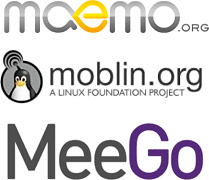
Jim Zemlin handled out a brief statement calling the decision "disappointing," although the handwriting should have been on the wall for months. MeeGo got a "lukewarm" (read cold) reception this week at the Mobile World Congress in Barcelona — buggy, slow, disappointing. "It doesn’t look like Meego will be a serious competitor anytime soon," wrote Slashgear.
But there's been no blog post yet about it, at either Linux.Com or Linuxfoundation.org. This is an important story. This may be as disappointing to me as the brief statement. If the site wants to be corporate that's fine. If they want to grow the community we need a little more.
It might help, for instance, to point out where Meego can and should go from here:
Intel Needs to StepUp — The company's new mobile chip, dubbed Medfield, was sampled at MWC. More telling was $26 million in investments from Intel Capital, which includes solutions for securing your identity, location-based services and open source video. They talked about tablets.
But stepping up means more. It means delivering a MeeGo reference design, and a commitment to maintaining software compatibility across all MeeGo platforms. (That's something Android doesn't have.) It means giving Taiwanese OEMs something they've sought from Intel for 15 years now — something they can build easily and ship profitably.
A blog post from Barron's illustrates why Intel is reluctant to do this. Medfield can run multiple operating systems. Intel doesn't want to anger possible OEM partners who run Android by putting too much stock in MeeGo. But the result at its press conference just looked lame.

To say that doesn't make me anti-Android or anti-Google. It makes me a realist. Google tried to have it both ways, writing a Java and Linux it could control, and it doesn't work that way. Rather than using genuine open source (i.e. GPL) parts, it went with some proprietary Sun code Oracle decided it didn't want to play nice with.
MeeGo can become an alternative for Android OEMs who want to reduce their legal risk, if the Linux Foundation is willing to sell it that way. You're not piling-on to Google, you're being realistic. Give people a glide path to a royalty-free Linux and they may come to it when the legal heat gets too hot.

Again, deliver reference designs. Don't just talk, do. Show people how they can integrate MeeGo into a solution, at a very low price point, to deliver Linux embedded in homes, in TVs, in cars, as well as on consumer devices of all kinds. Make MeeGo your Linux, not just a Linux.
Again, both the Foundation and Intel have reasons not to do this. It might anger other distros. It might anger other OEMs.
Fine. In that case drop the whole thing. If you're too afraid of angering someone that you won't do business you're not in business at all. This may in fact be the Foundation's bottom line. They're not really in business. They don't aim to make money. They aim to boost Linux. But if that's the case why did they get involved with MeeGo in the first place?
There are a lot of questions in what I have written, a lot of demands for answers that may not be forthcoming. But that is just the problem. In business you either stand for something or you'll stand for anything. Lead, follow, or get out of the way.
Which is it?










colon cleanse recipe
Dana Blankenhorn: Creating a Future for MeeGo
buy instagram like
Dana Blankenhorn: Creating a Future for MeeGo
phen375 reviews
Dana Blankenhorn: Creating a Future for MeeGo